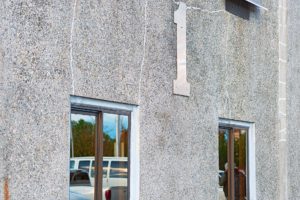Basically when something the City of Everett owns breaks…these folks fix it. That’s why there’s a new urgency for a very expensive replacement project at the headquarters, shops, buildings and work areas for the Everett Public Works Department itself.
Some of the public works buildings are subject to failure in an earthquake. In addition to the obvious physical danger to employees, it also means crews wouldn’t be able to get to needed equipment or materials in the event of a major disaster. That can domino into all kinds of issues for emergency responders and regular Everett residents.
For the last eight years managers at the Everett Public Works department have tried to find a cost effective way to either repair what they’ve been patching for decades or find another location that provides the needed safety and access to operate, replace and maintain Everett’s infrastructure. Over that time the number one answer keeps coming back to tearing down what they have now and rebuilding in their current location.
This Wednesday the Everett City Council is expected to authorize a call for bids to replace the Everett Public Works facilities at a cost of $70 million dollars. There will be a range of methods to pay off that big bill including selling of surplus city property and a rate increase for your utility bill. Here’s a further explanation of what is planned and the reasons why as provided by Kathleen Baxter who handles public information and education for the Everett Public Works Department…
City of Everett officials are highlighting the need to replace the aging Public Works Service Center, which would play a critical role following a disaster. In the event of a major emergency, the current condition of several Public Works buildings poses a significant risk to Everett residents and the hundreds of thousands of people outside the city who get their water from the Everett Water System.
The 14-acre Public Works Service Center campus is located just east of downtown on Cedar Street. Some of the buildings date back to 1971, including Building 1, the administration building that houses the maintenance and operations functions of the City’s water, sewer, and road systems, as well as engineering, permit services, and traffic control.
Both Building 1 and Building 4, from which crews and equipment deploy, have been evaluated by outside engineering teams and found to not meet the minimum life-safety performance levels for buildings in the regional earthquake zone. Engineers predict that the two buildings would sustain enough structural damage during a design-level event (the maximum considered earthquake based on specific location, soil type and the building’s lateral-force-resistance system) that they would be in danger of partial or even complete collapse.
“In the event of a major disaster like an earthquake, Public Works facilities and personnel are critical to immediate and long-term recovery efforts,” said Dave Davis, public works director. “Given the state of our facilities today, we would face severely damaged or even destroyed buildings, which would cause significant to catastrophic response delays.”
Plans are underway to redevelop the Service Center campus, by demolishing existing buildings and constructing a new office building for City administrative functions, maintenance shops, a consolidated warehouse, street-level parking for employees and public vehicles, covered parking for maintenance vehicles, and enclosed parking for the City’s service trucks.
With the help of several consultants, including DLR Group, the City has conducted research since 2008 to determine the most expedient way to solve the problem of replacing the facilities while mitigating the cost to ratepayers and water customers outside the city limits. Options included seismic retrofitting, partial reuse of existing buildings with new construction, and relocation to a new site. None of those options met the criteria for a fully functional department, within a feasible budget, that provides the highest uninterrupted service to the City and its citizens.
Ultimately, DLR Group determined that building a new Service Center complex on the existing site is the most efficient and cost effective path to providing for these critical facilities to remain functional during a major emergency.
The cost of the redevelopment is estimated to be $70 million (an amount that includes construction, sales tax, legally mandated contingency fees, design, data and communications systems, moving, and furniture). The average monthly cost of this project to single-family Everett households, in the form of utility bill increase, is estimated at $1.80 per month per year as shown below:
- Year 1 $1.80/month
- Year 2 $3.60/month
- Year 3 $5.40/month
- Year 4 $7.80/month
The Public Works Department is seeking City Council’s concurrence on Wednesday, Oct. 5 to proceed with the next phases: schematic design and design development for the project.
The City of Everett water system now supplies water to about 570,000 people or 80 percent of the businesses and residents of the Snohomish County through a network of local water providers.
For more information
More information about the project can be found on the Service Center project webpage:www.everettwa.gov/servicecenter.








October 1, 2016
Everett, Everett Government